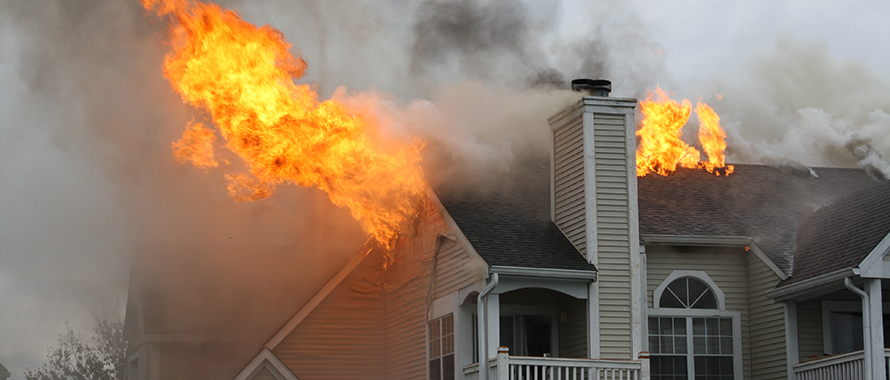A bedroom fire at an apartment complex in northwest Austin, Texas, on Nov. 4 was reportedly caused by a laptop left charging on a bed. The blaze, which displaced one resident but caused no injuries, was extinguished by a sprinkler system and caused an estimated $8,000 in property damage, CBS Austin reported. Just days later in the same city, a Nov. 7 apartment complex fire started by an improperly discarded cigarette displaced multiple families and caused about $50,000 in property damage and $50,000 in damage to contents.
The Austin fires are among several apartment complex blazes to make headlines in recent days. Police in Des Moines, Iowa, said a Nov. 8 apartment fire was caused by a tenant attempting to light a bug on fire on a futon, while a cooking-related fire the same day in Sherman, Texas displaced many families and killed at least one family dog. On Nov. 7, a fire at a two-story apartment complex in the Dallas area reportedly killed one man and a dog.
In addition to the tragic loss of life that is possible with apartment fires, these incidents can cause catastrophic losses for residents and property owners alike.
“Fire can be very devastating,” said Danielle Alessandrini, Associate Vice President, Underwriting Director, Personal Insurance, Burns & Wilcox, Detroit/Farmington Hills, Michigan. “There is the loss of contents, no longer having a roof over your head and lengthy repairs that may be needed, depending on the severity of the fire.”
Important insurance policies for apartment complex owners include Commercial Property Insurance, Commercial General Liability (CGL) Insurance and Pollution Legal Liability Insurance. Without insurance, these incidents can be disastrous for all parties involved.
“With an apartment fire, you are looking at not just damage to the tenants’ property but also the integrity and the structure of the building itself,” said Dylan Kamen, Broker, Commercial Insurance, Burns & Wilcox, Denver, Colorado. “If you are underinsured and face a million-dollar loss, for example, it can be career-ending if you have to pay for the loss out of your own pocket.”
Fire losses are a major risk for apartment complex owners
In August, an apartment building fire in East St. Louis, Illinois, killed five young children who were reportedly left unattended in the unit, the St. Louis Post-Dispatch reported. The mother was charged Nov. 3 over the tragedy, and the apartment owner recently told press that the blaze was the result of a candle being left burning in the unit, according to a Fox 2 Now report.
On Oct. 25, one man was hospitalized and 15 residents were displaced after an apartment fire in Hamilton, Ontario, was reportedly sparked by “careless” smoking, CBC reported. The fire caused an estimated $225,000 in damages.

Fire can be very devastating. There is the loss of contents, no longer having a roof over your head and lengthy repairs that may be needed, depending on the severity of the fire.
Of the estimated 1.4 million fires that U.S. fire departments responded to in 2020, about 6% occurred in apartments, according to the National Fire Protection Association. These fires caused 10% of overall civilian fire deaths and 19% of fire injuries.
To help protect against fire-related losses and other covered events, owners of apartment complexes generally carry Commercial Property Insurance to cover the physical property itself and CGL Insurance for third-party injuries or property damage. Beyond fires, this can include slip-and-falls on outdoor walkways or trips in hallways, for example.
“We see a lot of claims for slip-and-fall accidents, oftentimes when a maintenance crew does not salt during the winter and someone falls,” Kamen said. “That is why you want to have liability coverage.”
Building Personal Property Insurance can cover equipment being used by workers, while Inland Marine Insurance can extend to tools owned by a maintenance team. Equipment Breakdown Insurance can offer coverage for hot water tanks, heating systems and other large appliances, and insurance coverage is also available for outdoor apartment signs and sewer backups.
“There are a slew of insurance coverages available to apartment owners,” Kamen explained. “It is better to offer as much coverage as possible. The cost up-front for insurance is part of proper risk mitigation. You could pay a little bit more up front now, but it can protect you from having a huge potential loss and deficit later down the line.”
Business interruption coverage can be added to the Commercial Property Insurance and can help with the cost of housing displaced residents in a hotel while repairs are made after a fire. “If the whole building burnt down or a whole floor was smoked out and you were not able to collect rent, or you need to put up tenants in a hotel, normally that can be covered by the business interruption coverage so that the owner is not completely at a loss,” he said.
Other recommended risk management steps for rental property owners include keeping close tabs on routine maintenance, including for fire safety features in the building like sprinklers and smoke detectors, and upgrading electrical wiring as needed.
“Owners should be familiar with the building’s systems and ensure they are in working order,” Kamen said. “Know your building and where any shortfalls are, and know how to take preventative measures. You want to minimize any potential loss whenever you can.”
Apartment complex owners should work with an experienced, specialized insurance broker who “knows their market and knows the product,” he added. “You want a broker who can find that sweet spot of getting you the best possible coverage and making sure you are getting the best possible deal, as well,” he said. “Make sure you have your building insured to value, and that you have the right insurance coverages. That is very important.”
Separate insurance required for existing pollutants
A building owner’s Commercial Property Insurance will often contain a small limit for environmental cleanup related to a covered loss, such as a fire. This can help with the cost of removing debris or pollutants that are released because of a fire, such as a basement tank that ruptures and affects the soil, or chemicals that are spilled during the incident, said Timothy Donnellon, Senior Broker, Environmental, Burns & Wilcox, Charleston, South Carolina.
“That coverage is only for pollution cleanup from the covered loss under the property policy; it is not going to extend to pollution just occurring from the property,” Donnellon said.
That is an important distinction, because even if a pollutant like lead-based paint is found during the course of fire-related repairs, it would not be covered by Commercial Property Insurance. Instead, apartment complex owners need to have separate Pollution Legal Liability Insurance. “Landlords should have Pollution Legal Liability Insurance, not necessarily because of what happens after a fire, but because properties often have mold claims or asbestos exposure claims, and fire restoration work could bring attention to those issues,” he explained.
The limited coverage in Commercial Property Insurance also will not cover third-party environmental losses, which would need to be covered by Pollution Legal Liability Insurance. After an apartment fire, for example, the combustion of plastics could create a soot that impacts third parties, Donnellon said. “If you have a big fire at a large apartment building that is next to a car dealership and all the cars get coated with that soot, the property policy is not going to pay to clean that up.”
Other expenses that can be covered by Pollution Legal Liability Insurance include pollution removal, legal defense against third-party claims, settlements, loss of use, bodily injuries, and more. “The bodily injury claims tend to be the most significant when it comes to pollution,” Donnellon noted. “It does not take a lot of a pollutant to cause a lot of bodily injury.”
Apartment building owners may also want to ask about coverage for non-owned disposal sites and transportation pollution liability. “These are often embedded in a Pollution Legal Liability Insurance policy,” he said. “If when that waste is being disposed of, the vehicle transporting it tips over into a river and causes an environmental incident, that could also be covered.”
To help prevent and mitigate these losses, apartment complex owners are encouraged to have mold management plans, properly maintain fire protection equipment and conduct periodic inspections of the property. “Pollution claims are typically low frequency but high severity,” he said. “We rarely quote a policy that does not have at least a $1 million limit.”
Risks of charging laptops, electrical devices
In September of 2020, the National Fire Protection Association issued a press release urging caution around charging laptops and other electrical devices at home. The association reported that between 2014 and 2018, computer or computer equipment fires caused $50 million in direct property damage. It is one of many ways renters can be at risk for apartment fires, Alessandrini said.
“Individuals do not think that charging a device will cause something to ignite, but so often it does,” she said. “Curling irons, hair dryers, phone chargers; these are all things that can cause a fire.”

Individuals do not think that charging a device will cause something to ignite, but so often it does. Curling irons, hair dryers, phone chargers; these are all things that can cause a fire.
Individuals who are renting a single-family home typically need a broader type of coverage, often known as Tenant-Occupied Home Insurance. This can cover damage due to lightning, wind or hail, for example. “These renters need coverage for the rental home itself, as well as their contents,” Alessandrini said. “Whether you are staying there for a long time or a brief period, you will need that coverage.”
Theft may be included in some of these policies, but it could be a limited amount of coverage and will depend on the policy form used. “You have to be very careful about finding out whether theft is included,” she pointed out.








